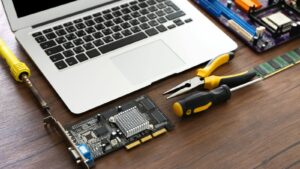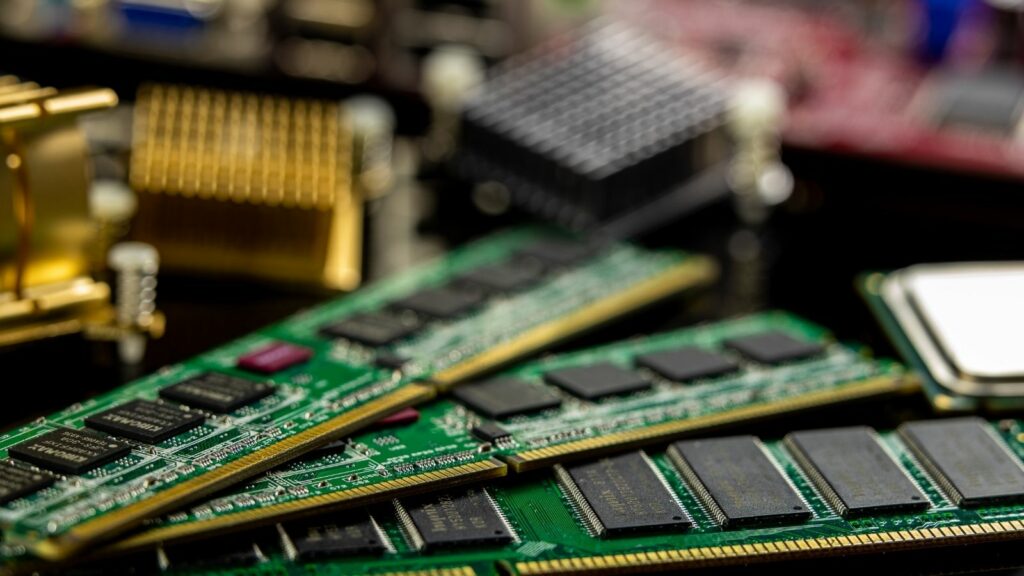”
Key Takeaways
- Educational Foundations: A bachelor’s degree in computer engineering or electrical engineering is essential, while a master’s degree offers advanced specialization and enhances career prospects.
- Importance of Certifications: Pursuing industry-relevant certifications, such as CHT and CESE, validates expertise in specific areas and increases job market competitiveness.
- Hands-on Experience: Internships and co-op programs provide valuable practical experience, helping students apply theoretical knowledge and develop critical skills.
- Continuous Learning: Given the rapid evolution of technology, ongoing education through workshops and certifications is crucial for staying relevant in the field.
- Skill Development: Mastery in technical skills like circuit design and microprocessor programming, along with soft skills such as teamwork and problem-solving, is vital for success.
- Career Progression: Computer hardware engineers generally start in entry-level positions, with opportunities for advancement into specialized and leadership roles as they gain experience and expertise.
In today’s tech-driven world, computer hardware engineers play a crucial role in shaping the devices that power our daily lives. From designing intricate circuit boards to optimizing system performance, these professionals are at the forefront of innovation. Understanding the educational path to becoming a computer hardware engineer is essential for aspiring tech enthusiasts.
A solid foundation in computer science, electrical engineering, or a related field is vital for anyone looking to excel in this dynamic career. With the rapid advancements in technology, educational programs are evolving, offering specialized courses that equip students with the skills needed to thrive. This article delves into the key components of a computer hardware engineer’s education, highlighting the essential degrees, certifications, and hands-on experiences that pave the way for success in this exciting field.
Computer Hardware Engineer Education
Computer hardware engineer education comprises several essential components that shape the skills and knowledge required for success in this field.
Degrees
 A bachelor’s degree in computer engineering, electrical engineering, or a related discipline serves as the foundational requirement. Graduates typically study circuit theory, computer architecture, and system design.
A bachelor’s degree in computer engineering, electrical engineering, or a related discipline serves as the foundational requirement. Graduates typically study circuit theory, computer architecture, and system design.
An increasing number of professionals pursue master’s degrees focusing on advanced topics, such as integrated circuit design or computer network architecture. Graduate studies enable deeper specialization and enhance career prospects.
Certifications
Certifications can further bolster a computer hardware engineer’s qualifications. Relevant certifications include Certified Hardware Technician (CHT) and Certified Embedded Systems Engineer (CESE). These credentials validate expertise in specific areas and enhance job market competitiveness.
Practical Experience
Hands-on experience, obtained through internships or co-op programs, plays a crucial role in professional development. Many educational institutions partner with technology companies, offering students opportunities to gain real-world experience.
Working on projects, such as designing prototypes or troubleshooting existing hardware, allows students to apply theoretical knowledge, fostering critical thinking and problem-solving skills.
Continuing Education
Ongoing education remains vital in the fast-paced technology sector. Engineers often attend workshops, webinars, or pursue further certifications to stay abreast of technological advancements. Lifelong learning ensures they adapt to evolving industry standards and maintain relevance in their roles.
Through comprehensive education, aspiring computer hardware engineers gain the skills necessary to excel in a competitive job market, contributing effectively to the advancement of technology.
Degree Programs
Computer hardware engineer education typically starts with a bachelor’s degree, which provides fundamental knowledge and skills. Advanced degrees further enhance expertise and specialization in the field.
Bachelor’s Degree in Computer Engineering
A bachelor’s degree in computer engineering comprises core subjects, including digital systems, microprocessors, and circuit design. Students complete coursework that combines theory with hands-on labs, fostering practical skills. Many programs also include collaborative projects, allowing students to work in teams to solve engineering challenges. Accredited programs typically require about 120 to 130 credit hours and include key topics such as:
- Computer architecture
- Operating systems
- Software design
- Signal processing
Internships or cooperative education experiences are highly encouraged, offering real-world applications of learned concepts.
Master’s Degree in Computer Engineering
A master’s degree in computer engineering allows for deeper specialization in areas like embedded systems, VLSI design, or computer networks. This program often requires 30 to 36 credit hours, including a thesis or capstone project. Students engage in advanced study, which enhances research skills and knowledge in current technologies. Relevant coursework may include:
- Advanced computer architecture
- Network security
- Embedded systems design
- Machine learning applications
Graduates often pursue roles in research and development, enhancing their competitiveness in the job market while contributing to innovative technology advancements.
Essential Skills and Knowledge
Computer hardware engineers require a blend of technical and soft skills to thrive in the fast-paced technology sector. Mastery of these skills enables engineers to design, develop, and maintain complex hardware systems effectively.
Technical Skills
- Circuit Design: Engineers must understand circuit design principles to create efficient electronic systems.
- Microprocessor Programming: Knowledge in microprocessor programming languages helps in developing embedded systems effectively.
- Digital Systems: Proficiency in digital systems enables engineers to analyze and design systems utilizing digital logic.
- Simulation Software: Familiarity with simulation tools, like MATLAB and SPICE, aids in testing and validating hardware designs.
- Hardware Description Languages: Expertise in hardware description languages, such as VHDL or Verilog, is vital for designing and modeling hardware circuits.
- Troubleshooting: Engineers need strong troubleshooting skills to diagnose and resolve hardware issues quickly.
- Networking Basics: Understanding fundamental networking concepts facilitates better hardware integration in networked environments.
- Problem-Solving: Engineers must possess strong problem-solving skills to tackle design challenges and hardware failures.
- Communication: Effective communication skills are essential for collaborating with teams and presenting technical concepts to non-technical audiences.
- Teamwork: Ability to work well in teams promotes synergy among engineers, designers, and project managers, ensuring project success.
- Time Management: Strong time management skills help engineers meet deadlines while juggling multiple projects.
- Adaptability: The capacity to adapt to new technologies and methodologies is crucial for keeping skills relevant in an evolving field.
- Attention to Detail: A keen attention to detail ensures that designs meet specifications and function correctly during implementation.
- Analytical Thinking: Analytical skills enable engineers to evaluate hardware performance and develop innovative solutions for improvement.
Career Path
Computer hardware engineers typically follow a structured career path, starting from entry-level positions and advancing to more specialized roles. The journey involves gaining experience, acquiring credentials, and developing expertise in various areas of technology.
Entry-Level Positions
Entry-level positions in computer hardware engineering often include roles such as hardware engineer, design engineer, and systems engineer. These positions generally involve tasks like designing components, testing prototypes, and collaborating with cross-functional teams. Responsibilities include:
- Conducting tests to evaluate hardware performance.
- Assisting in the development of circuit designs and schematics.
- Troubleshooting hardware issues in devices or systems.
- Documenting engineering processes and findings.
Entry-level professionals usually work under the supervision of experienced engineers and gain hands-on experience that helps lay a solid foundation for career advancement.
Advanced Roles
Advanced roles in computer hardware engineering offer opportunities in specialized areas and leadership positions. Examples of advanced roles include:
 Lead Hardware Engineer: Oversees project teams, ensures design integrity, and manages project timelines.
Lead Hardware Engineer: Oversees project teams, ensures design integrity, and manages project timelines.- Systems Architect: Designs complex hardware systems, integrating various components to meet user requirements.
- Research and Development Engineer: Focuses on innovating new technologies and improving current systems, often requiring advanced degrees and research experience.
Advanced roles typically require strong expertise in specific technical domains, and responsibilities may include:
- Leading design and analysis efforts for new products.
- Developing specifications for hardware/software interfaces.
- Mentoring junior engineers and facilitating professional development.
Achieving these advanced positions often involves ongoing education, participation in professional organizations, and obtaining relevant certifications to stay competitive in the evolving tech landscape.
Industry Certifications
Certifications play a vital role in enhancing the credentials of computer hardware engineers. Various industry certifications validate expertise and can significantly improve employability. Here are key certifications in the field:
- Certified Hardware Technician (CHT): This certification focuses on essential hardware knowledge and skills, covering installation, maintenance, and troubleshooting of computer hardware components.
- Certified Embedded Systems Engineer (CESE): This certification emphasizes skills related to embedded systems, including hardware design, software development, and system integration.
- CompTIA A+: This entry-level certification provides foundational knowledge in hardware and software support, making it ideal for those new to the field.
- Cisco Certified Network Associate (CCNA): This certification emphasizes networking fundamentals, which are crucial for hardware engineers working with networked systems.
- Electronics Technicians Association (ETA) Certifications: Various certifications from ETA cover topics like electronic fundamentals, fiber optics, and renewable energy, allowing engineers to specialize in specific areas.
Gaining these certifications often requires passing rigorous exams, demonstrating proficiency in core subjects, and meeting continuing education requirements. Professionals may pursue multiple certifications to align their skills with emerging industry demands, ensuring they remain competitive and relevant in the fast-evolving technology landscape.
Acquiring Essential Technical Skills
A robust education in computer hardware engineering opens doors to a dynamic and rewarding career. By acquiring essential technical skills and soft skills through degree programs and certifications, aspiring engineers position themselves for success in a competitive job market.
Continuous learning and practical experience are vital for staying relevant in this fast-paced field. As technology evolves, so too must the knowledge and expertise of those who design and optimize the hardware that powers our devices. With dedication and the right educational foundation, future computer hardware engineers will play a crucial role in shaping the technological landscape.
“



